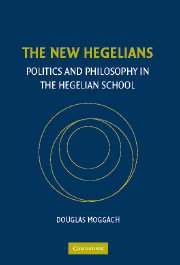Book contents
- Frontmatter
- Contents
- Acknowledgements
- Contributors
- Introduction: Hegelianism, Republicanism, and Modernity
- 1 Eduard Gans on Poverty and on the Constitutional Debate
- 2 Ludwig Feuerbach's Critique of Religion and the End of Moral Philosophy
- 3 The Symbolic Dimension and the Politics of Left Hegelianism
- 4 Exclusiveness and Political Universalism in Bruno Bauer
- 5 Republican Rigorism and Emancipation in Bruno Bauer
- 6 Edgar Bauer and the Origins of the Theory of Terrorism
- 7 Ein Menschenleben: Hegel and Stirner
- 8 ‘The State and I’: Max Stirner's Anarchism
- 9 Engels and the Invention of the Catastrophist Conception of the Industrial Revolution
- 10 The Basis of the State in the Marx of 1842
- 11 Marx and Feuerbachian Essence: Returning to the Question of ‘Human Essence’ in Historical Materialism
- 12 Freedom and the ‘Realm of Necessity’
- 13 Work, Language, and Community: A Response to Hegel's Critics
- Bibliography
- Index
4 - Exclusiveness and Political Universalism in Bruno Bauer
Published online by Cambridge University Press: 22 August 2009
- Frontmatter
- Contents
- Acknowledgements
- Contributors
- Introduction: Hegelianism, Republicanism, and Modernity
- 1 Eduard Gans on Poverty and on the Constitutional Debate
- 2 Ludwig Feuerbach's Critique of Religion and the End of Moral Philosophy
- 3 The Symbolic Dimension and the Politics of Left Hegelianism
- 4 Exclusiveness and Political Universalism in Bruno Bauer
- 5 Republican Rigorism and Emancipation in Bruno Bauer
- 6 Edgar Bauer and the Origins of the Theory of Terrorism
- 7 Ein Menschenleben: Hegel and Stirner
- 8 ‘The State and I’: Max Stirner's Anarchism
- 9 Engels and the Invention of the Catastrophist Conception of the Industrial Revolution
- 10 The Basis of the State in the Marx of 1842
- 11 Marx and Feuerbachian Essence: Returning to the Question of ‘Human Essence’ in Historical Materialism
- 12 Freedom and the ‘Realm of Necessity’
- 13 Work, Language, and Community: A Response to Hegel's Critics
- Bibliography
- Index
Summary
The entire course of post-Hegelian reflection can be defined as a many-faceted attempt to respond to the crisis provoked by the collapse of a society that had beendivided into estates (Stände). The political reflection of the Hegelian school was confronted by the task of rethinking the relation between the individual and the state, on theone hand and, on the other, of finding a new organisational principle capable of holding together the mass ofatoms liberated by the dissolution of the old estate order. In this framework there emerged philosophies of history that attempted to construct a principle of social organisation by looking ahead to the future, anticipating a new synthesis of the individual with the political whole.
What distinguishes the reflections of Bruno Bauer is the extreme radicalism and consistency with which he confronted the crisis, almost identifying himself with the forces that had provoked it. It is with Bauer that the crisis becomes an epochal event: not only a crisis of political concepts, but also of theology and of metaphysics. In a series of lengthy historical studies, Bauer tries to reconstruct the genesis of the crisis, delineating a movement of long duration, at whose origin lies the concentration of powers in the modern absolutist state; but also a crisis of brief duration, due to a rapid historical acceleration in the wake of the French Revolution. According to Bauer, it was precisely the absolute monarchy that had prepared the terrain for the republic through a levelling of the Stände.
- Type
- Chapter
- Information
- The New HegeliansPolitics and Philosophy in the Hegelian School, pp. 91 - 113Publisher: Cambridge University PressPrint publication year: 2006
- 4
- Cited by



